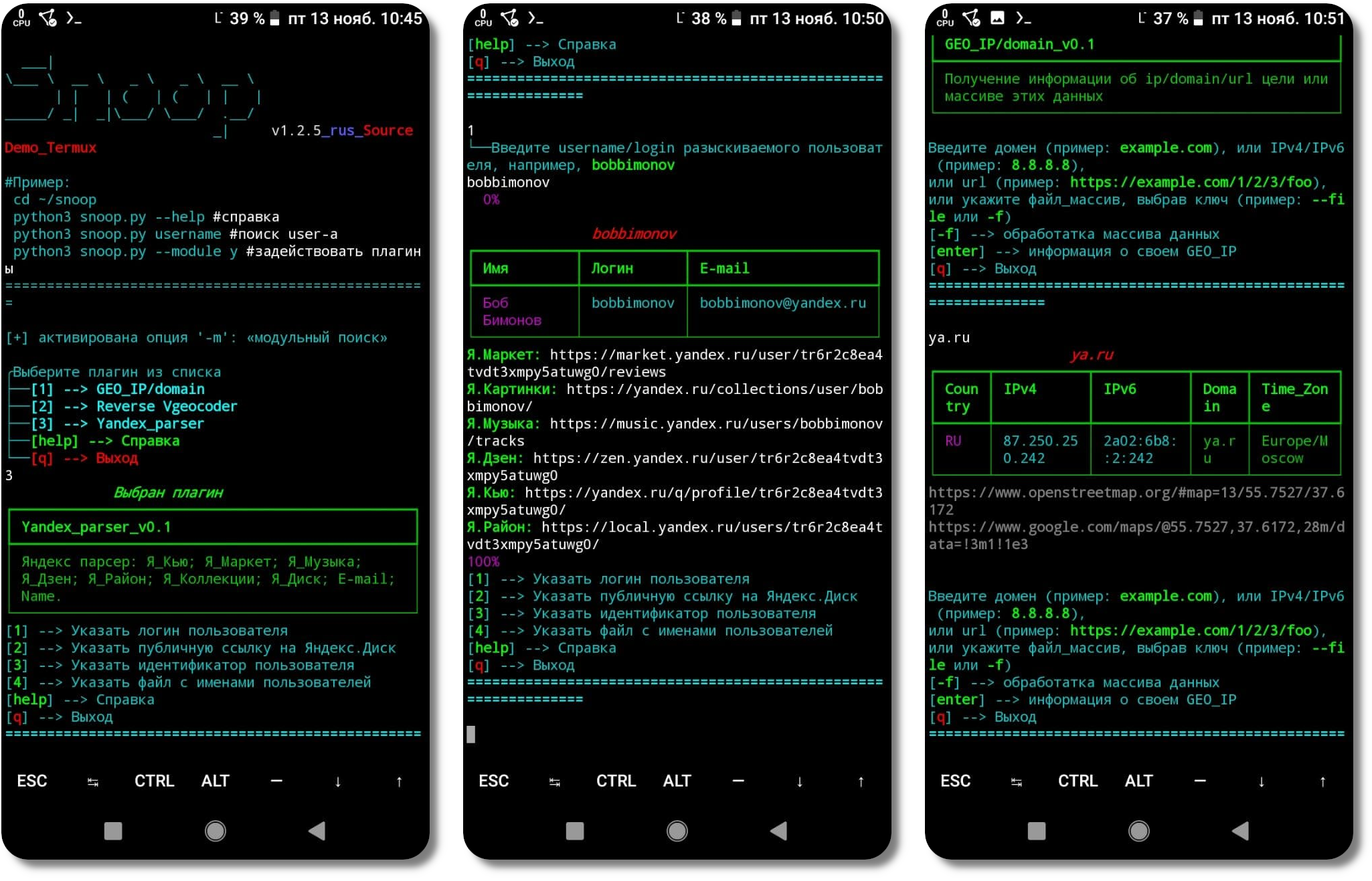README_android.en.md 10 KB
Snoop Project for Termux
Snoop Project is one of the most promising OSINT tools — search by nickname
- [X] This is the most powerful software taking into account the CIS location.


Is your life slideshow? Ask Snoop.
Snoop project is developed without taking into account the opinions of the NSA and their friends,
that is, it is available to the average user.
Self-build software from source
Snoop for Android/Demo

Self-build software from source
Native Installation
Install Termux
# NOTE_1!: if the user has errors with $ 'pkg update', for example due to country censorship,
# and/or due to the fact that Termux has not been updated for a long time on the user's device,
# then removing/installing Termux application will not help,
# since after deletion, old repositories remain on the user's device, the solution is:
$ termux-change-repo
# and choose to get updates (for all repo) from another mirror repository.
# Open access to disk
$ termux-setup-storage
# Install python3 and dependencies
$ apt update && pkg upgrade && pkg install python libcrypt libxml2 libxslt git
$ pip install --upgrade pip
# Clone the repository
$ git clone https://github.com/snooppr/snoop
# Enter the Snoop working directory
$ cd ~/snoop
# Install the 'requirements.txt' dependencies
$ python3 -m pip install -r requirements.txt
# Optional↓
# To expand the terminal output in Termux (by default, 2k lines are displayed in the CLI),
# for example, displaying the entire database of the option '--list-all [1/2]'
# add the line 'terminal-transcript-rows=10000' to the file '~/.termux/termux.properties'
# (the feature is available in Termux v0.114+).
# Restart Termux.
# The user can also launch the Snoop Project on the snoop command from anywhere in
# the cli by creating an alias.
$ cd && echo "alias snoop='cd && cd snoop && python snoop.py'" >> .bashrc && bash
# The user can also run a quick check on the database of the site he is interested in,
# without using the 'list-all' option, using the 'snoopcheck'command
$ cd && echo "alias snoopcheck='cd && cd snoop && echo 2 | python snoop.py --list-all | grep -i'" >> .bashrc && bash
# restart Termux.
# At the end of the search work snoop on the request to select "with which to open the search results" select the default / system HTMLviewer.
# NOTE_2!: to auto-open search results in an external web-browser:
$ cd && pkg install termux-tools; echo 'allow-external-apps=true' >>.termux/termux.properties
NOTE_3!: if the Android user has a flawed (i.e. OS 12+ version with many limitations) and breaks Termux, read the instructions for solving the problem here.
NOTE_4!: old patched python versions 3.7-3.11 from are supported termux_tur repo.

Using
usage: python snoop.py [search arguments...] nickname
or
usage: python snoop.py [service arguments | plugins arguments]
$ python snoop.py --help
Help
optional arguments:
-h, --help show this help message and exit
service arguments:
--version, -V printing versions of :: OS; Snoop;
Python and Licenses
--list-all, -l Print detailed information about the
Snoop database
--donate, -d Donate to the development of the Snoop Project,
get/buy Snoop Full Version
--autoclean, -a Delete all reports, clear cache
--update, -U Update Snoop
plugins arguments:
--module, -m OSINT search: use various plugins Snoop ::
IP/GEO/YANDEX
search arguments:
nickname The nickname of the wanted user.
Searching for several names at the same time is
supported. Nicknames containing a space in their name
are enclosed in quotation marks
--verbose, -v When searching for 'nickname', print detailed
verbalization
--web-base, -w Connect to search for 'nickname' to the updated web_DB
(4800+ websites). In demo version the function is disabled
--site , -s <site_name>
Specify the name of the site from the database
'--list-all'. Search for 'nickname' on one specified
resource, it is acceptable to use the '-s' option
multiple times
--exclude , -e <country_code>
Exclude the selected region from the search,
it is permissible to use the '-e' option several times,
for example, '-e RU -e WR' exclude Russia and World from search
--include , -i <country_code>
Include only the selected region in the search,
it is permissible to use the '-i' option several times,
for example, '-i US -i UA' search for USA and Ukraine
--country-sort, -c Print and record_results' by country,
not alphabetically
--time-out , -t <digit>
Set maximum time allocation for waiting for a response
from the server (seconds). Affects the search duration.
Affects 'Timeout errors:' On. this option is necessary
with a slow Internet connection (by default 9s)
--found-print, -f Print only found accounts
--no-func, -n ✓Monochrome terminal, do not use colors in url
✓Disable opening web browser
✓Disable printing of country flags
✓Disable indication and progress status
--userlist , -u <file>
Specify a file with a list of users. Snoop will
intelligently process the data and provide additional reports
--save-page, -S Save found user pages to local files (slow mode)
--cert-on, -C Enable verification of certificates on servers.
By default, certificate verification on servers is disabled,
which allows you to process problematic sites without errors
--headers , -H <User-Agent>
Set the user-agent manually, the agent is enclosed in
quotes, by default a random or overridden user-agent
from the snoop database is set for each site
--pool , -p <digit> Disable auto-optimization and set manually
search speed from 1 to 300 max. processes. By
default, high load on computer resources is used
in Quick mode, in other modes, moderate power consumption is
used. Too low or high value can significantly slow down the
operation of software. ~The calculated optimal value for this
device is displayed in 'snoop info', parameter
'Recommended pool', option [--version/-V]. This option
is suggested to be used 1) if the user has a
multi-core computer and RAM reserve or, on the contrary, weak,
rented VPS 2) It is recommended to speed up and slow down the
search in tandem with the option [--found-print/-f']
--quick, -q Fast and aggressive search mode.
Does not reprocess failed resources,
which speeds up the search,
but also slightly increases Bad_raw.
Quick mode adapts to PC power,
does not print intermediate results,
is effective and is designed for Snoop full version
Example
# To search for just one user:
$ python3 snoop.py username1
# Or, for example, Cyrillic is supported:
$ python3 snoop.py олеся
# To search for a name containing a space:
$ python3 snoop.py "bob dylan"
$ python3 snoop.py bob_dylan
$ python3 snoop.py bob-dylan
# To search for one or more users:
$ python3 snoop.py username1 username2 username3 username4
# Search for multiple users - sorting the output of results by country;
# avoid long freezes on sites (more often the 'dead zone' depends on your ip-address);
# print only found accounts; save pages found
# of accounts locally; specify a file with a list of wanted accounts;
# connect to search for Snoop's extensible and updatable web-base:
$ python3 snoop.py -c -t 9 -f -S -u ~/file.txt -w
# Search for two usernames on two resources:
$ python snoop.py -s habr -s lichess chikamaria irina
# Get Snoop full version:
$ python snoop.py --donate
# 'ctrl-c' — abort search
Found accounts will be stored in '/storage/emulated/0/snoop/results/nicknames/*{txt|csv|html}'.
csv open in *office, field separator comma.
Destroy all search results - delete the directory '~/snoop/results'.
or python snoop.py --autoclean
# Update Snoop to test new software features:
$ python3 snoop.py --update #requires a Git installation.
An example snoop for android

• ⋮ Run an aggressive repository compaction on December 11, 2024. A full history backup was saved. Users building Snoop from source should do a new 'git clone'.